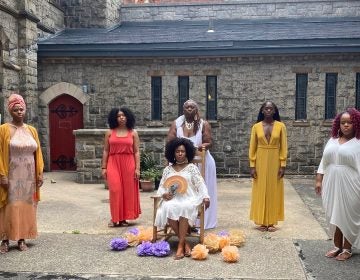After 159 years, the UPenn Glee Club goes co-ed
The all-male singing group is considered an unofficial ambassador of the Ivy League school, even as it excluded women’s voices.
Listen 2:10
Members of both the Glee Club and the Penn Sirens. (Courtesy of UPenn)
The University of Pennsylvania Glee Club is the oldest student performing arts group at UPenn. The singing group formed 159 years ago, during the Civil War, as a men’s group. It has remained a men’s group ever since, singing a repertoire of arrangements for tenor and bass voices.
Now, it will be singing a new tune. Last week, the Glee Club formally merged with the Penn Sirens, an all-female campus singing group. The Sirens formed in 2011 in response to the men-only Glee Club, singing arrangements for higher alto and soprano voices.
“We’ve definitely striven to be sort of the sister group counterpart,” said Sirens president Marina Dauer, a junior at Penn studying political science and environmental studies. “Just coming up on our 10-year history, it’s hard to compete with an organization coming up on a 160-year history. It’s hard to have those two groups be equalized.”
Both the Glee Club and the Penn Sirens are student-run groups, not associated with a campus department or academic credit. They are done entirely for fun. However the Glee Club, with its august campus history, is often tapped to be an unofficial ambassador for the Ivy League school. In their distinctive red and blue blazers, members of the Glee Club perform at many official campus functions, from the convocations at the beginning of the academic year to graduations at the end.
The Glee Club often travels. It’s sung in all 50 states, performed for presidents at the White House, and toured internationally several times, including South America, Asia, and Eastern Europe.
The new, combined group will be called the Glee Club. The name Sirens will be used for a sub-group focusing on singing arrangement for just alto and soprano. Performances of the full Glee Club will include arrangements for both male and female voices.
“The main consideration is we can expand our repertoire,” said Glee Club president Jake Milner, a senior in the Wharton School studying finance and accounting. “We can do more musically than we currently can when we have singers with all the voice ranges.”
That expanded repertoire was not the sole consideration. Although Penn often spotlights the Glee Club for its official events, Milner said the club does not represent the diversity of the school
“We are an all male-identifying chorus,” said Milner. “That doesn’t represent the student body of Penn.”
Milner added that while the instrumental accompanists who sometimes join the Glee Club can be any gender, as well as the technical crew that puts on their shows, the singers have always been male.
The Glee Club has to recruit new members each year as older members graduate, and at the height of its popularity it could have about 40 voices. Right now it has 20. Part of that reduced membership can be blamed on the COVID-19 pandemic, but Milner says the downward slide started years earlier.
“To cut the group’s size in half over three years — that’s a pretty drastic decline,” he said. “I think that shows that we were behind the times, that we had some thinking to do if we wanted to make the group more inclusive, make it more desirable to join, to audition, to be a part of.”
As a student-run organization, the Glee Club leadership can make decisions independent of the University. However, when the club decided to open its ranks to all gender identities, the University stepped in to see that the historic move was done equitably.
First, they had to check in with Glee Club alumni to see if there were any objections. There was some concern, but most alumni were supportive, according to Laurie McCall, director of Student Performing Arts at UPenn.
“Then we had them talk with the Women’s Center staff and the LGBTQ Center staff to talk about how to develop a community,” said McCall. “How are you going to all of a sudden just be the right culture and the right environment for the rest of the genders that you have not included all these years?”
The University urged the Glee Club to not simply open their auditions to women, but build a culture that would be more inviting to women. Merging with the Sirens would not only incorporate a singing culture already centered around women, but would also avoid creating competition between the two groups.

“We’re not taking away from the Glee Club and its history and traditions and amazing reputation, but adding to it,” said Dauer. “Another point that we talk about is how the Glee Club is the ‘unofficial musical ambassador of the University,’ and it’s hard to use that phrase when not every student can be considered for membership in the singer section. So I’m really excited that this change will be taking that requirement away.”
The first combined performance of the Glee Club and the Penn Sirens will be next month at the annual Baccalaureate ceremony, a traditional interfaith event before graduation commencements. Due to the pandemic, the ceremony will be virtual: each voice of the combined Glee Club will record themselves individually, then be mixed together in a pre-recorded video.
On the program will be the Glee Club’s signature song, “Afterglow,” written in 1964 for the club’s male tenor and bass voices by Bruce Montgomery, who was its director for 44 years. “It’s been Glee Club-specific, really, for its entire existence. It is the Glee Club song. That’s how it’s known. It’ll stay that way, it’ll just now be rearranged or soprano, alto, tenor, bass, instead, which is definitely a big change,” said Milner.

Get daily updates from WHYY News!
WHYY is your source for fact-based, in-depth journalism and information. As a nonprofit organization, we rely on financial support from readers like you. Please give today.







